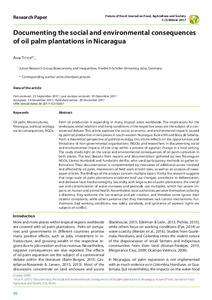Datum
2017-12-29Autor
Tittor, AnneSchlagwort
630 Landwirtschaft, VeterinärmedizinMetadata
Zur Langanzeige
Aufsatz

Documenting the social and environmental consequences of oil palm plantations in Nicaragua
Zusammenfassung
Palm oil production is expanding in many tropical areas worldwide. The implications for the landscape, social relations and living conditions in the respective areas are the subject of a controversial debate. This article explores the social, economic, and environmental impacts caused by palm oil production in two places in south-eastern Nicaragua: Kukra Hill and Boca de Sábalos. From a theoretical perspective of political ecology, this article reflects on the opportunities and limitations of non-governmental organisations (NGOs) and researchers in documenting social and environmental impacts of one crop within a process of agrarian change in a local setting. The study sheds light on the social and environmental consequences of oil palm cultivation in both places. The text departs from reports and documentation gathered by two Nicaraguan NGOs, Centro Humboldt and Fundación del Rio, who used participatory methods to gather information. Their documentation is complemented by interviews of additional actors involved and affected by oil palm, impressions of field work at both sites, as well as an analysis of newspaper articles. The findings of the analysis concern multiple topics. Firstly, the research suggests that large-scale oil palm plantations accelerate land use changes, contribute to deforestation, and decrease local food sovereignty. Secondly, with large-scale oil palm plantations, the overall use and contamination of water increases and pesticide use multiplies, which has severe impacts on human and animal health. Nevertheless, local authorities perceive themselves as facing a dilemma: they welcome the tax revenue and job creation, and therefore some ignore their citizens’ complaints, while others perceive that they themselves lack control mechanisms. Furthermore, bad working conditions, low safety standards, and ignorance of workers’ rights are subjects of conflict.
Zitierform
In: Future of Food: Journal on Food, Agriculture and Society. Witzenhausen : University of Kassel, Department of Organic Food Quality and Food Culture. - Vol. 5, No. 3 (2017), S. 46-61Zitieren
@article{urn:nbn:de:hebis:34-2017112153837,
author={Tittor, Anne},
title={Documenting the social and environmental consequences of oil palm plantations in Nicaragua},
year={2017}
}
0500 Oax 0501 Text $btxt$2rdacontent 0502 Computermedien $bc$2rdacarrier 1100 2017$n2017 1500 1/eng 2050 ##0##urn:nbn:de:hebis:34-2017112153837 3000 Tittor, Anne 4000 Documenting the social and environmental consequences of oil palm plantations in Nicaragua / Tittor, Anne 4030 4060 Online-Ressource 4085 ##0##=u http://nbn-resolving.de/urn:nbn:de:hebis:34-2017112153837=x R 4204 \$dAufsatz 4170 7136 ##0##urn:nbn:de:hebis:34-2017112153837
<resource xsi:schemaLocation="http://datacite.org/schema/kernel-2.2 http://schema.datacite.org/meta/kernel-2.2/metadata.xsd"> 2018-01-04T12:56:05Z 2018-01-04T12:56:05Z 2017-12-29 2197-411X urn:nbn:de:hebis:34-2017112153837 http://hdl.handle.net/123456789/2017112153837 eng Department of Organic Food Quality and Food Culture at the University of Kassel, Germany and Federation of German Scientists (VDW) Urheberrechtlich geschützt https://rightsstatements.org/page/InC/1.0/ Oil palm Monocultures Nicaragua political ecology social consequences NGOs 630 Documenting the social and environmental consequences of oil palm plantations in Nicaragua Aufsatz Palm oil production is expanding in many tropical areas worldwide. The implications for the landscape, social relations and living conditions in the respective areas are the subject of a controversial debate. This article explores the social, economic, and environmental impacts caused by palm oil production in two places in south-eastern Nicaragua: Kukra Hill and Boca de Sábalos. From a theoretical perspective of political ecology, this article reflects on the opportunities and limitations of non-governmental organisations (NGOs) and researchers in documenting social and environmental impacts of one crop within a process of agrarian change in a local setting. The study sheds light on the social and environmental consequences of oil palm cultivation in both places. The text departs from reports and documentation gathered by two Nicaraguan NGOs, Centro Humboldt and Fundación del Rio, who used participatory methods to gather information. Their documentation is complemented by interviews of additional actors involved and affected by oil palm, impressions of field work at both sites, as well as an analysis of newspaper articles. The findings of the analysis concern multiple topics. Firstly, the research suggests that large-scale oil palm plantations accelerate land use changes, contribute to deforestation, and decrease local food sovereignty. Secondly, with large-scale oil palm plantations, the overall use and contamination of water increases and pesticide use multiplies, which has severe impacts on human and animal health. Nevertheless, local authorities perceive themselves as facing a dilemma: they welcome the tax revenue and job creation, and therefore some ignore their citizens’ complaints, while others perceive that they themselves lack control mechanisms. Furthermore, bad working conditions, low safety standards, and ignorance of workers’ rights are subjects of conflict. open access In: Future of Food: Journal on Food, Agriculture and Society. Witzenhausen : University of Kassel, Department of Organic Food Quality and Food Culture. - Vol. 5, No. 3 (2017), S. 46-61 Tittor, Anne </resource>
Die folgenden Lizenzbestimmungen sind mit dieser Ressource verbunden:
Urheberrechtlich geschützt

